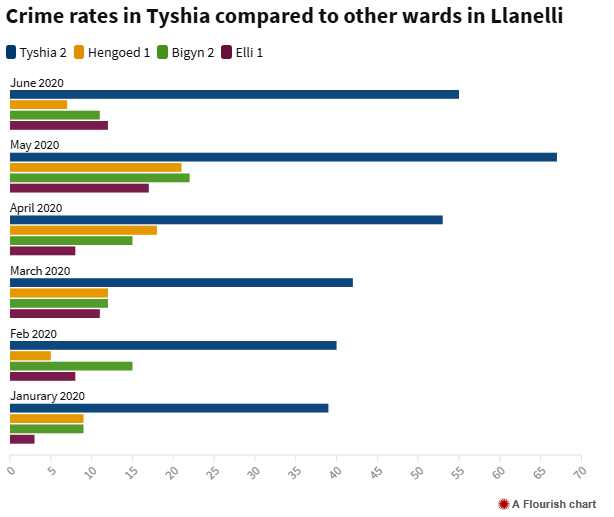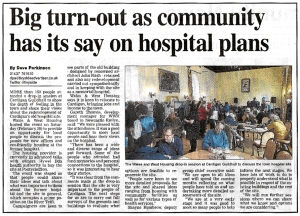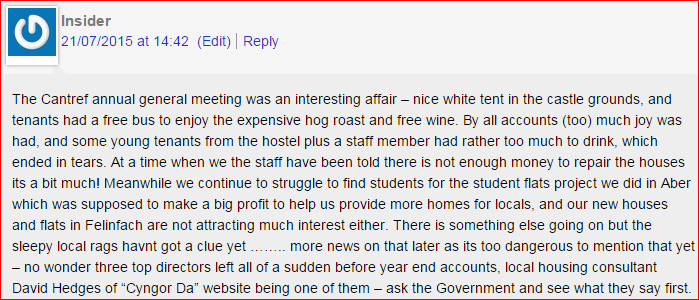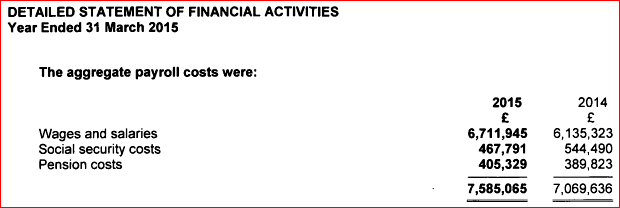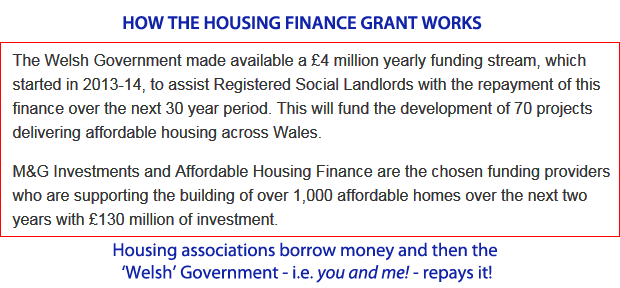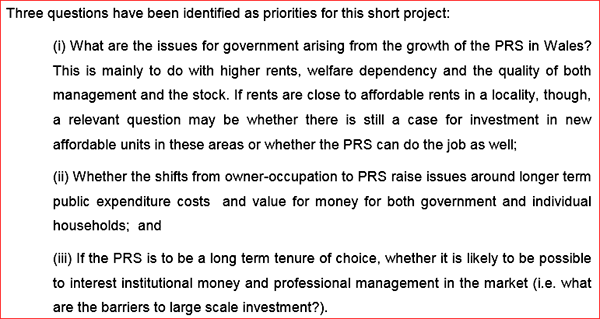![]() This post, the last before Christmas, deals with a ‘consultation process’ that could result in changes being implemented that will prove very damaging to Welsh communities.
This post, the last before Christmas, deals with a ‘consultation process’ that could result in changes being implemented that will prove very damaging to Welsh communities.
◊
PANELS, REPORTS, RECOMMENDATIONS
You may remember that some six years ago I submitted a Freedom of Information request to the ‘Welsh Government’ asking how many homelessness organisations there were in Wales. The answer I got was 48.
It may be more by now. It will certainly be more in the future if the desired changes are made to the legislation relating to homelessness.
Let’s begin in June 2019 with the ‘Welsh Government’ setting up a Homelessness Action Group “to recommend the steps needed to end homelessness in Wales“.
This is the group’s final report to the ‘Welsh Government‘ in July 2020. In it I noticed a reference to the Ending Homelessness National Advisory Board (previously known as the Housing Support National Advisory Board).
This second group also promises to end homelessness. Here’s a link to their riveting report from August this year.

Let’s return to the Homelessness Action Group. Its report is heavy on recommendations but nowhere could I find the names of those who sit on the group. Nor was it signed off by the chair or secretary.
I eventually found the names of the group members on the website of an organisation called Crisis, the driving force behind the whole exercise. An English outfit that’s done what so many do by renting a cupboard in Cardiff and pretending to be Welsh.

When I saw the name Jon Sparkes my soul soared, for I hoped it might be a misspelling, and a reference to that great observer of Welsh life who gave us Hugh Pugh, Shadwell, Old Mr Fffff et al; but no, for it was definitely Jon, not John.
Jon Sparkes OBE has moved on from Crisis to become CEO of UNICEF UK.

Before considering the outcomes of these deliberations and their possible consequences, I want to mention a third assemblage of the wise and the caring. This is the Expert Review Panel, or Legal Reform Panel, announced by Julie James 30 March 2022.
The Expert Review Panel reported to James, Minister for Climate Change, in October. Here’s the report. It was delivered to Chez James because she was the Minister for Housing and Local Government who set up the original Homelessness Action Group back in 2019.
Here’s how Crisis celebrated the Panel’s findings.
Apart from three local authority representatives I don’t see much Welsh representation. It’s the usual melange of third sector chisellers and memsahibs living high on the hog of public funding. (Though don’t get me wrong! – I’m sure they’re all vegans.)
Cardiff University and the Labour party (virtually one and the same nowadays) are also in the mix.
And again, Crisis seems to be playing the leading role in this farce.

Named with the Crisis Wales policy team is Abi Renshaw. But since October she’s been Business Support Coordination Officer for Community Housing Cymru (CHC), the umbrella organisation for our Registered Social Landlords (RSLs).
CHC is controlled by the ‘Welsh Government’. Which means that someone who moved from Bristol last year, a woman who knows sod all about Wales, has landed a cushy, well-paid (and almost certainly unnecessary) job, in Corruption Bay.
That’s modern Wales in a nutshell.
On page 88 of the report we read that some on the panel – you can guess who! – wanted to create a new post of Housing / Homelessness Regulator.
I often lie awake at night wondering how we manage without a Housing / Homelessness Regulator, on £100,000 a year. Of course we’d need a Deputy Regulator. And perhaps an Assistant Regulator.
With a staff of 50 . . . until the new department finds its feet and expands.
After all, Wales can afford it.
◊
WHITE PAPER, CONSULTATION
What you’ve read so far leads us to the White Paper put out by the ‘Welsh Government’ on October 10 asking for feedback. So here’s a link to the Consultation on the White Paper on Ending Homelessness in Wales.
As you flick through it you’ll see that it’s laid out in chapters, each one concluding with ‘Consultation questions’.
A number of highlighted ‘proposal’ sections are designed to catch the eye. Here’s a selection, together with my comments:
The first will put you in the mood for the unhinged ramblings that follow. And it would be impossible to surpass this example of what German academics call Bollockssprecht.
“ . . . the local housing authority should be obliged to ask an applicant from the Gypsy, Roma and Travelling Community whether or not they are culturally averse to bricks and mortar“.

If they are not “culturally averse“, and they take a Welsh home, does that mean they no longer qualify as members of the, “Gypsy, Roma and Travelling Community” – and can they expect to be evicted?
Come to that, why would anyone from those communities be applying for a home of the hated “bricks and mortar” variety in the first place?
Who could write that bollocks and keep a straight face? But if it was written with a straight face then the poor soul who wrote it needs help.
I’m getting a headache just thinking about it, so let’s move on.
Next up, ‘Intentionality’. A clumsy-looking word that refers to persons making themselves deliberately homeless.

In practice, changes here could result in someone giving up a secure tenancy in Yorkshire – thereby making themselves intentionally homeless – and then being able to demand housing in Pembrokeshire.
It is a very, very bad idea.
One of the current safeguards against abuse of the system is the ‘local connection’ rule, which says you must have lived in an area for at least six months to qualify for social housing. The qualification period is far too short, but it’s something.
Yet some regard it as asking too much.
This passage from the consultation document exposes the split between third sector chisellers and local authorities. The second paragraph makes clear that the push to drop the local connection rule entirely came from the English cupboard-dwellers in Crisis.

An existing way of getting around the local qualification rule has been to claim a family connection with the area. I’ve seen this operate.
Someone with no local connection gets housed after claiming some exceptional status, and before you know it, the extended family has moved to the area through being able to claim a ‘familial connection’.

This proposal seems to suggest keeping the already inadequate ‘familial ties’ rule, but watering it down to where it would be meaningless.
The paragraphs above suggest removing the local connection rule altogether; but something else I’ve lifted, and you can see below, suggests achieving the same objective by a series of changes rather than in one fell swoop.

I would guess that the reference to “Prison leavers” refers to the massive new prison in Wrecsam, HMP Berwyn, where most of the prisoners are from England. Think how that might work out.
There are clearly three main ‘targets’ where change is sought by the chisellers heretofore mentioned.
Local connection and intentionality we’ve looked at, which leaves access to public funds. The situation at present is that persons subject to immigration control cannot claim public funds unless an exception applies.
A footnote to page 93 reads: “The Welsh Government have (sic) recently launched a supplementary Migrant Victim of Abuse Support Fund, which will be piloted for a year by BAWSO. We intend to use the learning from this pilot, together with the evaluation of the Home Office’s Support for Migrant Victims Scheme to shape the design of longer-term support to meet the needs of migrant victims in Wales.”
BAWSO is an organisation catering for women of colour. It has received vast amounts of funding over the years – over £3m in ‘Welsh Government’ grants and contracts in the twelve months ending 31.03.2022 – and is now a major property owner. Its founder, Mutale Merrill, also has a nice property portfolio of her own.
Though the original, Homelessness Action Group, set up in 2019, in its report recommended, in the section headed ‘Ending Migrant Homelessness’ (page 26), “Providing guidance to local authorities, clearly setting out the duties owed to migrant households with no recourse to public funds.”
I suspect that the ‘Welsh Government’ and its third sector cronies are trying to circumvent as much as they can the UK immigration control legislation.
Let’s be clear: Any attempts to weaken or remove the existing requirements can only mean that the intention is to commandeer Welsh housing for people with no connection to Wales. This can only be done at the expense of Welsh people hoping for a home in their own country.
∼
I appreciate that it’s quite a daunting task to read all this stuff, so for a quicker read, here’s the Children’s and Young Person’s version.
◊
BUT WHY?
What we see here is a struggle between three different interests.
First, we have NGO shysters with no commitment to Wales or the Welsh people, concerned only with groups they’ve decided are ‘marginalised’, assorted ishoos, and themselves. These charlatans would flood Wales with ‘homeless’ and others from God knows where in order to increase their funding and their political clout.
Next, we have Welsh local authorities who are in the front line and can see the dangers from further relaxing regulations that are already too lax.
Finally, we have the ‘Welsh Government’, which invariably succumbs to Left-Woke pressure, but doesn’t want to risk alienating local councils too much, virtually all of which are run by Labour or its partner Plaid Cymru.
Though another factor in play with the ‘Welsh Government’ is virtue signalling on the world stage. For Corruption Bay loves to crow about measures it hopes might win plaudits from elsewhere.
We’ve already seen it with One Planet Developments, which has even been noticed by the World Economic Forum.

Then there was the Well-being of Future Generation Act, and the boast that, “The Act is unique to Wales attracting interest from countries across the world“.
But no other country has copied Wales’ lead. Revealing, that!
And how about the ‘Welsh Government’ being the first in the world to declare a climate emergency? Even though there’s no agreed definition of a climate emergency.
Perhaps the most recent example would be the disastrous introduction of 20mph speed limits. Overwhelmingly rejected in a poll published this week.
And the pattern is repeating itself with what at present is just a White Paper out for consultation. “World-leading“, be buggered!

But that claim is already being echoed by The Big Issue.
This is no way to run a country; standing on a stage, ignoring your own people to shout over their heads in the hope of attracting the attention of others who really don’t give a fuck what you get up to.
There’s something sad about it. Like a neglected or insecure child desperately seeking the attention and the approval of the adults in the room.
To satisfy these pathetic ambitions the ‘Welsh Government’ might implement the dangerous suggestions of organisations flooding into Wales because they view our country as more ‘receptive’ to their ideas, more ‘manageable’ than England.
I believe a majority of the Welsh public has run out of patience with the virtue-signalling clowns in Corruption Bay.
And increasingly, the politicians there realise it. This explains Drakeford’s departure. Either he realised his time was up, or his colleagues knew he had to go for them to have any chance of saving themselves.
Let’s keep up the pressure.
Make them realise we’ve had enough of grifters living off the Welsh public purse. Enough of perverts being allowed into schools. Enough of the ‘Saving the planet’ bullshit that encourages the exploitation of Wales. Enough of pandering to imaginary or contrived ‘minorities’. Enough of the war on farmers. Enough of the subservience to the Globalists’ anti-human agenda.
They can make a start by rejecting any and all suggestions to weaken the already inadequate rules on who qualifies for housing and other assistance in Wales.
Do that by telling Crisis where they can stick their agenda. And instead, remember our people, who are not “culturally averse to bricks and mortar“.
♦ end ♦
© Royston Jones 2023

